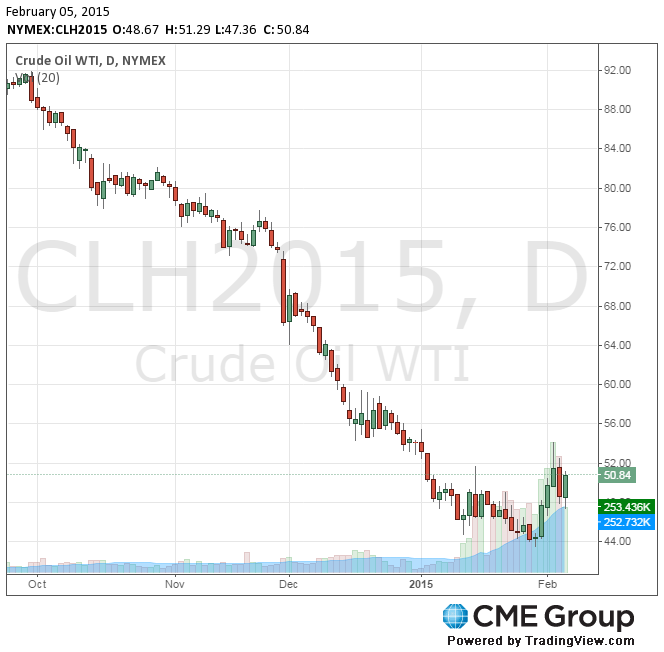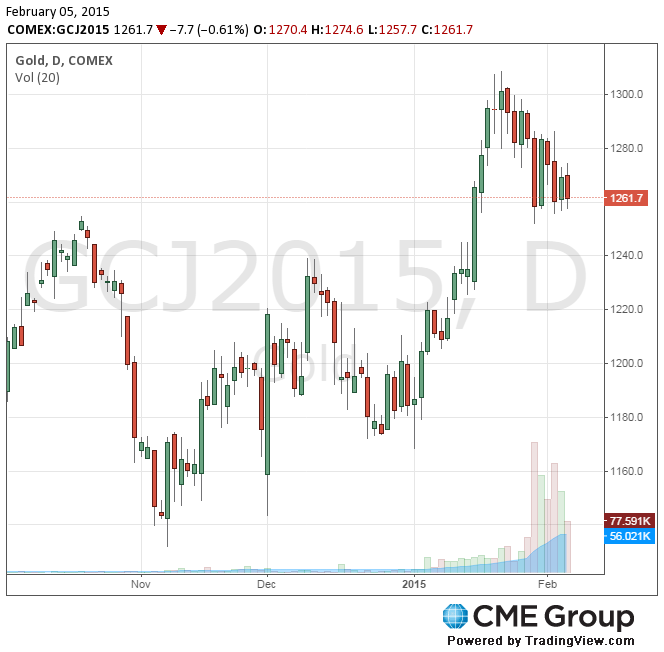Noticias del mercado
-
17:40
Oil traded below $50 a barrel
Oil traded below $50 a barrel amid the most volatility since April 2009 as U.S. crude stockpiles climbed to the highest level in more than three decades.
Futures erased gains of as much as 1.2 percent in New York to extend a 8.7 percent drop on Wednesday, the biggest slide since November. Crude inventories expanded by 6.33 million barrels to 413.1 million last week, Energy Information Administration data show. The increase was almost double the median estimate in a Bloomberg News survey of analysts.
Rising U.S. stockpiles are contributing to a global glut that drove prices almost 50 percent lower last year. Oil's "new normal" is $60 to $70 a barrel in the next few years, according to Eurasia Group, a New York-based consultant. Supply will exceed demand by 2 million barrels a day in the first half of 2015, said Iranian Oil Minister Bijan Namdar Zanganeh.
"There's still an overriding concern about supply," Jonathan Barratt, the chief investment officer at Ayers Alliance Securities in Sydney, said by phone. "It's all about finding a base and the volatility that we've seen shows it's trying to do that. As soon as we get any feeling about weak economics, that's going to hurt the price."
West Texas Intermediate for March delivery fell as much as $1.09, or 2.3 percent, to $47.36 a barrel in electronic trading on the New York Mercantile Exchange and was at $47.63 at 2:18 p.m. Singapore time. The contract lost $4.60 to $48.45 on Wednesday, halting the largest four-day rally since January 2009. The volume of all futures traded was about 9 percent above the 100-day average.
Brent for March settlement dropped as much as $1.09, or 2 percent, to $53.07 a barrel on the London-based ICE Futures Europe exchange. It decreased $3.75 to $54.16 on Wednesday. The European benchmark crude traded at a premium of $5.66 to WTI.

-
17:20
Gold fell
Gold notes decline as investors shrugged off mixed US economic data and focused on the situation with Greece.
US Department of Labor reports that the number of initial claims for unemployment insurance for the week ended January 31 rose by 11,000 to 278,000 from a revised 267,000 the previous week.
Analysts had expected the number of complaints increased by 10,000 to 277,000.
A separate report showed that the US trade deficit rose in December to $ 46.56 billion from $ 39.75 billion in November, whose figure was revised up from $ 39.00 billion. Analysts had expected in December, the trade deficit will fall to $ 38.00 billion .
Market participants are now preparing for Friday's report on employment in the US non-farm payrolls to obtain additional information regarding the strength of the recovery in the labor market.
Analysts predict that in January, the US economy added 231,000 jobs in December after 252,000, while the unemployment rate is projected to remain unchanged at 5.6%.
Strong employment rates in the non-agricultural sector, are likely to increase speculation about the timing recovery rates by the Federal Reserve System, while the weak values can contribute to the growth of gold, weakening incentives for early recovery rates.
Meanwhile, investors remain cautious because of the situation with Greece after the European Central Bank refused to accept Greek bonds as collateral for lending, shifting responsibility to provide additional liquidity to local banks to the central bank of Greece and put pressure on Athens.
The Greek government is trying to ease the debt pressure on the current debt of 240 billion euros causing fears of a possible conflict with its creditors, which can result in damage to the country and the euro area.
On Thursday, the main stock index has fallen sharply in Athens, while the yield on 10-year Greek government bonds jumped to nearly 11%.
April futures price of gold on the COMEX today fell to 1257.70 dollars per ounce.

-
12:20
Oil: prices regain ground after yesterday’s slump
Oil price gained after declining earlier in the session were yesterday's plunge further continued. Prices were under pressure as record high inventories in the U.S. were reported. The market halted the biggest four-day rally since January 2009 as stockpiles advanced 6.33 million barrels to 413.1 million, the highest level in at least three decades. Markets remain highly volatile. Brent Crude added +2.55%, currently trading at USD55.54 a barrel. On January 13th Crude hit a low at USD45.19 and began to rise on reports on declining rig numbers in the U.S. West Texas Intermediate rose by +1.82% currently quoted at USD49.33.
Worldwide supply still exceeds demand in a period of low global economic growth and the OPEC refusing to cut output rates to stabilize prices. Smaller OPEC members want to cut production but the organisation, responsible for 40% of worldwide production focuses on its fight for market share.
-
12:00
Gold prices decline
Gold is trading lower on Thursday after it rose yesterday on growing uncertainty over the developments in Greece and news that the ECB unexpectedly cancelled the acceptance of Greek bonds in return for funding forcing the Greek central bank to provide billions of emergency liquidity for banks in the weeks to come.
Market participants also look ahead to the Interest Rate Decision of the Bank of England scheduled for 12:00 GMT and a set of U.S. data including Initial Jobless Claims to get a better judgement on when the FED is going to hike interest rates. A future interest rate hike adds pressure on gold. Higher interest rates make gold less attractive as the metal is not yield-bearing. A stronger greenback recently also weighed on the dollar-denominated precious metal as it makes it more expensive for holders of other currencies
In January gold prices increased by almost 8% as the precious metal was sought after as safe-haven asset.
The precious metal is currently quoted at USD1,259.10, -0,75% a troy ounce. On Thursday the 22nd of January gold reached a five-month high at USD1,307.40.
-
10:20
Press Review: Greece Sticks to Anti-Austerity Demands Following ECB Loan Cut
BLOOMBERG
Greece Sticks to Anti-Austerity Demands Following ECB Loan Cut
(Bloomberg) -- Greece held fast to demands to roll back austerity as the European Central Bank turned up the heat before Finance Minister Yanis Varoufakis meets one of his main antagonists, German counterpart Wolfgang Schaeuble.
The encounter at 12:30 p.m. in Berlin comes hours after Greece lost a critical funding artery when the ECB restricted loans to its financial system. That raised pressure on the 10-day-old government to yield to German-led austerity demands to stay in the euro zone.
The government "remains unwavering in the goals of its social salvation program, approved by the vote of the Greek people," according to a Finance-Ministry statement issued overnight. It's aim is "coming up with a European policy that will definitively put an end to the now self-perpetuating crisis of the Greek social economy."
REUTERS
China stocks fall as central bank easing fails to impress; more stimulus expected(Reuters) - Chinese stocks erased earlier gains and closed 1 percent lower on Thursday, after an injection of more money into the system by the central bank failed to impress investors who are worried about an ongoing crackdown on high-leverage trading.
The yuan and money rates dipped after the People's Bank of China (PBOC) cut banks' reserve requirement ratios by 50 basis points, a widely expected stimulus move to support the world's second-biggest economy.
"The cut was largely priced in to the stock market (already), but it has reconfirmed an important message to investors that China's monetary cycle has firmly shifted to the loosening camp," Jing Ning, Portfolio Manager at Fidelity Worldwide Investment, wrote in a note to clients.
Source: http://www.reuters.com/article/2015/02/05/us-china-markets-idUSKBN0L90R920150205
REUTERS
Oil drops more than $1 after crashing on inventory concerns
(Reuters) - Oil prices fell more than $1 on Thursday, extending big losses in the previous session as record high inventories in the United States coupled with concerns over global demand had cut short a four-day rally.
Oil markets remain highly volatile, with U.S. crude losing 9 percent on Wednesday in one of its biggest routs. In the previous four sessions, prices had rallied almost 19 percent from their lowest in nearly six years.
Brent crude for March delivery had dropped $1.02 to $53.14 a barrel by 0633 GMT (1.33 a.m. EST), after touching $55 a barrel earlier in the day. The contract had settled $3.21 or 5.5 percent lower the previous day.
Source: http://www.reuters.com/article/2015/02/05/us-markets-oil-idUSKBN0L907420150205
-
00:32
Commodities. Daily history for Feb 4’2015:
(raw materials / closing price /% change)
Light Crude 48.45 -8.67%
Gold 1,264.50 +0.33%
-
